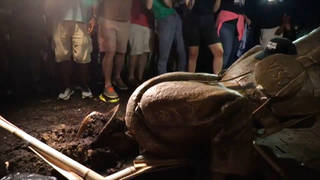
By Amy Goodman and Denis Moynihan
Around the country, people are resisting racism amid a rising white supremacist movement emboldened by the election of President Donald Trump.
The latest act of rebellion involves Silent Sam, a statue on the University of North Carolina campus in Chapel Hill. Hundreds of students rallied at the statue Monday night and tore the statue down, piling dirt on its head. Silent Sam, who doesn’t represent any one historical figure, was installed in 1913 to honor UNC students who fought for the Confederacy. Julian S. Carr, a Confederate veteran of the Civil War, delivered a speech at the statue’s unveiling, praising “this monument of bronze to honor the valor of all those whom fought and died for the Sacred Cause.”
During his speech in 1913, Julian Carr made this stunning admission of violence: “One hundred yards from where we stand, less than ninety days perhaps after my return from Appomattox [in 1865], I horse-whipped a negro wench until her skirts hung in shreds, because upon the streets of this quiet village she had publicly insulted and maligned a Southern lady, and then rushed for protection to these University buildings where was stationed a garrison of 100 Federal soldiers. I performed the pleasing duty in the immediate presence of the entire garrison, and for thirty nights afterwards slept with a double-barrel shotgun under my head.”
Among those who spoke at the Silent Sam rally on Monday night was Maya Little, an African-American doctoral student at UNC. She said: “A statue that advocates violence against us, that honors slave owners. At this statue I have felt degraded, and I have also been harassed. I have been surveilled by police. I have been called a nigger. I have been told that I will be hung from the tree right above Silent Sam.”
Last year, Democratic Gov. Roy Cooper called on the North Carolina Historical Commission to move three Confederate monuments currently on the state Capitol grounds in Raleigh, not far from the UNC campus. The committee voted 10-1 on Wednesday, less than two days after Silent Sam was toppled, to keep the Confederate statues in place, but to add information next to them for “context.”
“Context” is the same word Maya Little used to explain her own action against Silent Sam last April. She told us on the “Democracy Now!” news hour: “I threw my blood and red ink on the statue. I was providing the context that I, as a black person, and the other black students, workers and community members who had to walk by that statue and be degraded every day had to see, which is a literal noose hanging on our campus, which is a memorial to violence towards black people, to the people who enslaved my ancestors and sold their children. By pouring my blood and red ink on the statue, I hoped to contextualize it.” She goes to trial facing criminal vandalism charges in October.
Speaking on “Democracy Now!,” Maya Little provided just the kind of context the commission should consider: “This towering statue stood over what has been years of exploitation and abuse towards black people at UNC and in Chapel Hill. That includes the incredibly low retention rate for black male student athletes, despite the hundred million dollars a year this university makes through athletics. That includes the fact that UNC workers, who are largely black and brown, do not receive a living wage.”
According to the Southern Poverty Law Center, there are 718 Confederate statues around the country, along with 109 schools and 10 U.S. military bases named after Confederate icons.
The UNC students toppled Silent Sam one year after the violent neo-Nazi march in Charlottesville, Virginia, which was called to block the removal of a statue of Confederate Gen. Robert E. Lee. Activist Heather Heyer was killed when a white supremacist rammed his car into a crowd of anti-racist demonstrators.
On Wednesday, Richard Preston, imperial wizard of a chapter of the Confederate White Knights of the Ku Klux Klan, was sentenced to four years in prison for firing a gun into a crowd at the same rally. It was the first felony conviction to come out of several days of organized violence waged by mobs of racists that included, in the words of President Donald Trump, “many fine people.”
There are many fine people involved with organizing around Confederate statues, but they aren’t carrying torches or firing guns. They are working to overcome racism, tearing down monuments to oppression, and pursuing that elusive aspiration that all men, and women, are created equal.












Media Options